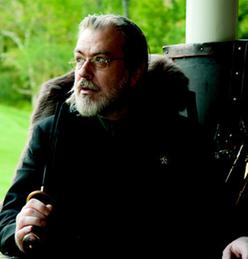 |
|
| Caleb Carr | |
Caleb Carr, a military historian and author "whose experience of childhood abuse drove him to explore the roots of violence--most famously in his 1994 bestseller, The Alienist, a period thriller about the hunt for a serial killer in 19th-century Manhattan," died May 23, the New York Times reported. He was 68.
Carr was 39 when he published The Alienist, a book he had first pitched as nonfiction. It wasn't, but read that way because of the exhaustive research he had done into the period and the historical figures who featured as characters. The Alienist was an immediate hit and earned glowing reviews. Even before it was published, the movie rights were acquired, though the project never made it to the big screen. In 2018, however, a 10-episode mini-series was released on TNT.
Magazine writers were captivated by Carr's "downtown cool--he lived on the Lower East Side of Manhattan, had been in a local punk band, wore black high-top sneakers and had shoulder-length hair--and by his literary provenance. His father was Lucien Carr, a journalist who was muse to and best friends with Beat royalty: the writers Jack Kerouac, William S. Burroughs and Allen Ginsberg. Beautiful and charismatic as a young man, 'Lou was the glue,' Ginsberg once said, that held the group together," the Times wrote.
Lucien Carr was also an alcoholic, and his son grew up in bohemian chaos, with his father raging at his wife and three sons but directing his most terrifying outbursts at Caleb, his middle child, whom he singled out for physical abuse.
"There's no question that I have a lifelong fascination with violence," Caleb Carr told Stephen Dubner of New York magazine in 1994, just before The Alienist was published. "Part of it was a desire to find violence that was, in the first place, directed toward some purposeful end, and second, governed by a definable ethical code. And I think it's fairly obvious why I would want to do that."
His father had been sexually molested by his Boy Scout master, David Kammerer, who followed Lucien Carr when he entered Columbia University. In 1944, Lucien Carr killed his longtime predator in Riverside Park, stabbing him with his Boy Scout knife and rolling him into the Hudson River. Kerouac helped him dispose of the knife. Carr turned himself in the next day and served two years for manslaughter in a reformatory.
Kerouac and Burroughs wrote about the incident in a novel, And the Hippos Were Boiled in Their Tanks, which was rejected by publishers and then mired in legalities before finally being published in 2008, when all the principals were dead. In 2013, the incident was the subject of a film, Kill Your Darlings, starring Daniel Radcliffe as Ginsberg.
Before The Alienist was published, Caleb Carr had been writing on military subjects, including a book with James Chace about national security and, on his own, a biography of an American soldier of fortune who became a Chinese military hero in the mid-19th century. In 1997, Carr published The Angel of Darkness, a sequel to The Alienist. His other works include The Italian Secretary (2005), Surrender, New York (2016), and Lessons of Terror: A History of Warfare Against Civilians (2002). His last book, published in April, was My Beloved Monster: Masha, the Half-Wild Rescue Cat Who Rescued Me.
"I have a grim outlook on the world, and in particular on humanity," he told Joyce Wadler of the Times in 2005. "I spent years denying it, but I am very misanthropic. And I live alone on a mountain for a reason."

